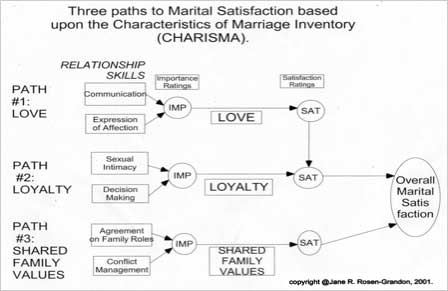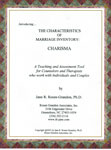Featured Products
Professionals
Counselors and Therapists can now quickly assess marital satisfaction in a particular couple. When used as an adjunct to therapy, CHARISMA identifies areas of satisfaction and dissatisfaction, identifies relationship skills which need to be developed, and provides counselors with an effective approach to helping couples.
The CHARISMA Inventory can be completed online or by hand. The entire Inventory contains only 37 items. Individuals rate each of the 18 marital characteristics using a six-point Likert-type scale twice: first, to measure the importance of marital characteristics to them as individuals, and second, to measure that individual’s satisfaction with those characteristics. A final question asks the participant for a global rating of their marital satisfaction.
Through discussion of results of the CHARISMA, clients and therapists alike are able to pinpoint problem areas in the relationship, gain a better understanding of how each partner feels, and identify areas of strengths and weaknesses. Not only does CHARISMA introduce three different influences on marital satisfaction, but it also suggests the necessary relationship skills for improving the relationship. Through identifying areas of dissatisfaction in the relationship, an agenda for therapy can be co- developed with your clients.
The CHARISMA Model:
Welcome to CHARISMA… the Characteristics of Marriage Inventory. Though this program was designed for use with married couples, it can also be used to help individuals decide what they want in a marriage, what has gone wrong in previous relationships, and how to improve current relationships.
Research was conducted at the University of North Carolina at Greensboro to answer the following questions:
- What factors effect marital satisfaction?
- What exactly can couples do to increase their marital satisfaction?
Referring to the Path Model below, this is what we found…
- There are three specific pathways which effect marital satisfaction: Love, Loyalty, and Shared Family Values.
- Each participant has rated a set of 18 marital characteristics along two dimensions. First, they have been asked to rate “How important is this characteristic to you?” and second, they have been asked, “How satisfied are you with this characteristic in your current relationship?
- As a result of difference scores, derived by subtracting IMPORTANT minus SATISFACTION, this research demonstrated that:
- There is a direct relationship between Shared Family Values and Marital Satisfaction.
- There is a direct relationship between Loyalty and Marital Satisfaction.
- However, with regard to Love, our research indicated that when it comes to achieving marital satisfaction, Love Is Not Enough! While it is true that Love is important, and Satisfaction with Love is important, Love does not provide a direct relationship to Marital Satisfaction. For even when Love is satisfying, if couples are unable to trust each other when their backs are turned, they will not be able to achieve Marital Satisfaction. To achieve Marital Satisfaction, Love must also include satisfaction with Loyalty.

Other ways to use the CHARISMA
For clients who are recovering from the loss of a relationship:
- help sort out what went wrong in their previous relationship.
- help gain insights into their true level of satisfaction with love, loyalty and shared family values in the relationship.
- help recall any Red Flags seen early in the relationship which existed in the areas of communication, affection, sexuality, approaches to decision-making, ideas about role expectations for men and women, and success as a couple in learning to manage conflict (versus avoid conflict).
- Identify problems associated with each partners’ family of origin.
- Identify family patterns that may continue to provide problems in this or any relationship?
For those who wish to know what to look for in future relationships:
- CHARISMA helps clients to clarify how they feel about the relative importance of 18 distinct marital characteristics.
- CHARISMA helps clients to clarify their desired level of satisfaction with 18 characteristics of marriage or significant relationships.
- CHARISMA helps clients to discuss with a prospective spouse, the nature of their differences when considering these 18 marital characteristics.
- CHARISMA helps clients to discuss ideas for how they will maintain a satisfying relationship using the following six relationship skills: communication, affection, sexuality, decision-making, assignment of roles, and conflict management.
- CHARISMA helps clients to discuss problems and disappointments they have each encountered in previous relationships.
- CHARISMA helps clients to discuss expectations for relationships with members of your extended family.
- CHARISMA helps clients to discuss a plan for using their marital skills on an ongoing basis.
- CHARISMA helps clients to discuss their individual visions for achieving marital satisfaction over the course of their lifetime together.


